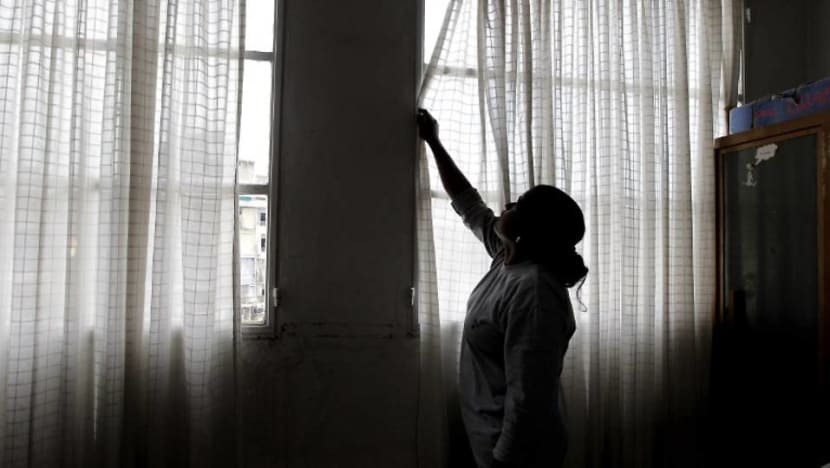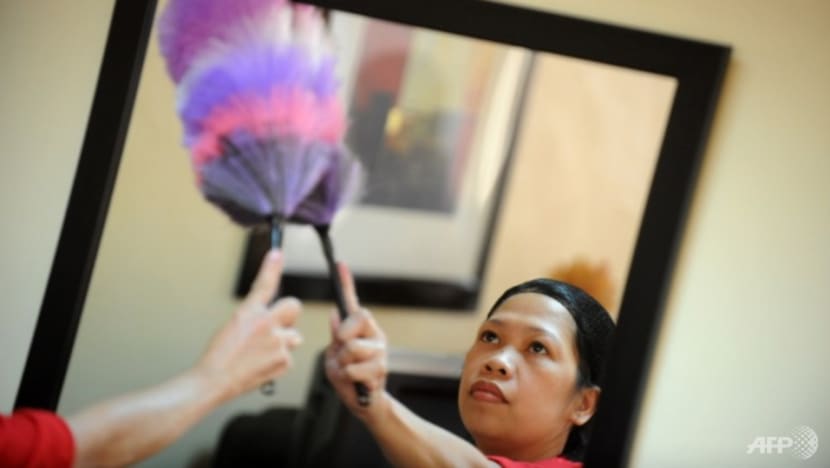commentary Commentary
Commentary: Can foreign domestic workers help with chores in homes of close family members?
The law is clear. We also encourage employers to work out a mutual agreement with FDWs in accompanying their charges to a relative’s place, says the Centre for Domestic Employees’ executive director Shamsul Kamar.

File photo of a foreign domestic worker.
SINGAPORE: Singapore’s attention was gripped in recent weeks by the acquittal of Parti Liyani, a foreign domestic worker, or FDW for short, who had been accused by her former employer of theft.
While many were intrigued by the sequence of events leading to Ms Liyani’s acquittal, the incident has thrust to the forefront a known but less discussed issue regarding migrant domestic work – the deployment of FDWs and the type of chores they do.
Non-Governmental Organisations (NGOs) like the Centre for Domestic Employees (CDE) deal regularly with complaints of illegal deployment from FDWs where they claimed to have been deployed to work at multiple households, made to perform non-domestic chores, or even provide cleaning services at commercial properties.
Such complaints rank alongside non-payment and short payment of salary as one of the top work-related issues that CDE assists FDWs with.
LISTEN: Can foreign domestic workers do extra chores? The dos, don'ts and difficult areas
READ: Commentary: The wrangling over rest days foreign domestic workers and their employers face in Phase 2
EGREGIOUS COMPLAINTS OF ILLEGAL DEPLOYMENT
In 2019 alone, 190 complaints of this nature were made to CDE, and they make up 11.5 per cent of all cases handled by us that year.
This year, in one of the most egregious illegal deployment complaints we have handled thus far, the complainant had to perform the full extent of domestic work at four different households, and on top of that, doubled up as a cleaner in an office.
Her employer unilaterally terminated her contract and attempted to repatriate her when they found out that a report was made to the Ministry of Manpower (MOM).
CDE intercepted the repatriation and eventually found her a new employer with the aid of our network of employment agents.
While most complaints regarding illegal deployment are less abhorrent, they still warrant our attention as they infringe on the fundamental rights of FDWs working in Singapore.

Yet, with that said, certain instances of suspected illegal deployment may take on various shades.
THE LAW IS CLEAR BUT REALITY CAN BE MESSY
In our experience, it may not always be fair to penalise the employers as some complaints could have risen out of misunderstanding between employers and FDWs, especially when FDWs are deployed to care for charges at the homes of close family members in the daytime while employers are at work.
Under current regulations, FDWs can be deployed with their charges, either children or elderly persons, to the homes of close family members of their employers in the daytime.
This is so that FDWs can continue to provide care to their charges under the supervision of the employers’ family members while their employers are at work.
This is permitted by MOM so long as FDWs accept the arrangements, are not required to perform household chores in the homes of the family members and receive adequate food and rest. The employer must declare such caregiving arrangements to MOM.
READ: Commentary: Worst time ever to be an overseas Filipino worker
READ: Asking foreign domestic workers to do extra work puts them in difficult position, not all lodge formal complaints with MOM: NGOs
From a regulatory standpoint, the law is clear.
From an empirical standpoint, however, it may not always be easy to differentiate neatly between what is considered household chores in the homes of the family members FDWs should not undertake, from incidental chores that might arise out of caregiving duties.
Certain household chores such as the cleaning of windows in the homes of close family members or doing the laundry for family members living in another household are clear infringements of the law because they do not form part of caregiving duties for charges. Other household duties, however, are less clear.
For instance, employers could state that their children or elderly require a clean environment and request for FDWs to mop the floor of the homes of their family members.
READ: Commentary: Physical punishment and why few parents openly admit they cane, smack or spank
READ: Commentary: In Singapore, battling the COVID-19 threat outside and the dengue peril at home
In preparing meals for their charges, FDWs could inevitably end up assisting in the preparation of meals for other family members.
The performance of such duties could be incidental and “by-products” of caregiving duties for charges.
Should we lump such incidental chores together with outright infringements like window cleaning and laundry in the same bucket, and penalise employers when their FDWs perform these incidental duties? Or should we outrightly outlaw these incidental chores and prohibit FDWs from performing them?
STRICT POLICING MAY NOT BE POSSIBLE OR DESIRABLE
It would be impossible for regulators to police every such incident. It would also likely be impractical to outlaw these incidental chores because more Singaporeans rely on FDWs to be primary caregivers for their dependents while they are at work.
CDE believes a more practical approach is for employers to work out a mutual agreement with FDWs on the type of incidental work to be performed in the homes of close family members, barring work not related to caregiving for charges.
To avoid ambiguity, employers could state these upfront in the employment contract.

The responsibility lies with the employer to communicate these incidental duties clearly and early to both FDW and close family members and ensure that family members do not deploy the FDW to perform additional household duties not part of caregiving.
Clear communications on the parameters of duties will benefit all parties by reducing misunderstanding and pre-empting accusations that could lead to the eventual breakdown of employment relationships.
BUT ZERO TOLERANCE ON ILLEGAL DEPLOYMENT MUST BE MAINTAINED
CDE adopts a zero-tolerance approach towards illegal deployment. FDWs should never be deployed to perform domestic work in multiple households, regardless of whether FDWs agree to such arrangements or receive monetary inducement to do so.
The authorities need to take a strong stance against employers who deploy FDWs to perform non-domestic work such as cleaning their offices, helping out in their shops, or even assisting in home-based businesses.
READ: The Big Read: For migrant workers in trouble, navigating Singapore’s legal system can be a challenge
READ: Commentary: How much should young couples spend on their first home?
An especially strong deterrent position must be taken against companies that knowingly employ FDWs as part-timers on their off days or against FDWs who moonlight.
Such positions are necessary to ensure that FDWs are protected against exploitative employment malpractices that may lead to burnout and subsequent health issues related to stress and overwork.
CDE would like to encourage FDWs and employers who are unsure about the employment rules of FDWs to reach out to us at our 24-hour helpline 1800 2255-233, so that we can advise accordingly.
Shamsul Kamar is Executive Director at the Centre for Domestic Employees.














